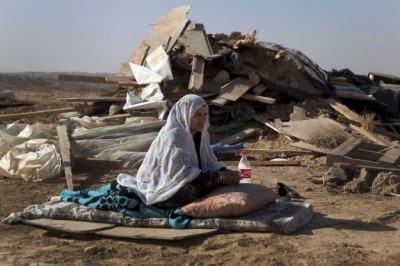In Photos: Israeli Bulldozers Raze Bedouin Community, Leave Children Without Water in High Temperatures

Hundreds of Israeli forces encircled al-Araqib village at 9:30am on 12 June; by 11:30am police had demolished most of the homes of the twenty remaining residents of al-Araqib who have lived in dire conditions since July 2010 when their village was first razed to the ground.
The village of al-Araqib, a Bedouin community in the Naqab (Negev) desert in the south of present-day Israel, was razed to the ground by state authorities for the sixty-ninth time since July 2010 last week. This demolition marked the first time police destroyed homes erected within the cemetery area of the village.
At 9:30am on Thursday, 12 June, approximately 350 police officers and special forces encircled the village and rounded up inhabitants in the makeshift mosque. Homes were bulldozed to the ground in about three hours and the rubble cleared away by 4:30pm.
Police then forcibly entered the makeshift mosque, arresting seven Bedouin and Jewish Israeli activists, amongst them two minors. Authorities demolished the mosque’s minaret and then left.
Villagers vow to remain. Since Thursday night they have been sleeping in the open with only trees and the sky as shelter. Police are permanently stationed outside the cemetery.
“We have no water, no beds, no kitchen, no bathroom. We have nothing but we are staying,” said Haqima Abumadegham al-Turi, mother of nine.
Al-Araqib is one of 35 unrecognized Bedouin villages in the Naqab. The state does not recognize the right of the Bedouin to live on the lands of al-Araqib and does not provide any basic services to them such as water or electricity.
Despite a protracted and ongoing legal battle between the village and the Israel Land Authority over ownership of the land, a government master plan sees al-Araqib classified as a recreational area. The Israel Land Authority and the Jewish National Fund have begun planting a forest on the Bedouin’s ancestral lands.
The village was first demolished on 26 July 2010, when roughly 300 people were left homeless. Since January 2011 twenty people have remained, building their homes within the village’s cemetery area. While demolition continued for structures built outside the cemetery perimeter, inside it the families found a safe haven.

All this changed on 21 May this year when police handed eviction orders to Sheikh Sayah al-Turi, head of the village. Despite a successful appeal by the village’s lawyer against the eviction orders, police lodged a new request, this time for a demolition order.
The court was due to convene to discuss the new request on Thursday afternoon but early that morning, the state was pushing the court to allow demolition of the homes.
As the village lawyer challenged the police’s request for permission to demolish that morning, state authorities ran against the clock to complete destruction of all homes before the district court ordered a halt to the operation.
Activists present say that police prevented villagers from showing them the court order and continued with the demolition, in contempt of the judge’s decision.
Most of the residents and activists arrested were released between Thursday night and Friday morning. Hani Abumadegham al-Turi, 19, was released on 17 June.

Police officers survey clean-up operations.
A fire breaks out in one of the evacuated homes during the demolition.
Activist and historian Gadi Algazi receives news of the new appeal filed by the village’s lawyer to halt the demolition. Police refuse to stop operations while the district court in Ramle convenes.
Sheikh Sayah al-Turi gives an interview with Palestinian media in Israel. “We will remain,” he vowed throughout the day.

Villagers were rounded up inside the makeshift mosque as soon as state authorities entered al-Araqib in the morning. Police forces surrounded the mosque throughout demolition operations.
Men pray in the makeshift mosque.
Police storm the mosque and forcibly arrest seven.
Representatives of the Israeli Nature and Parks Authority survey the situation. Al-Araqib is classified as a recreational area in the Israeli government master plan.
Police demolish the mosque’s minaret.
Shelters for residents’ livestock were destroyed during the demolition.
A Bedouin woman awaits news of her arrested son, 14-year-old Fayez Abumaegham al-Turi. He was released in the early hours of Friday morning.
Halia Abumadegham al-Turi, 17, films the demolition of her home.
After emptying water tanks, police load them onto trucks and took them away, leaving villagers, amongst them many children, without water in high temperatures.
Sujoud Abumadegham al-Turi, 7, loads some of her belongings in the family van before the police enter her village.

Police recorded villagers and activists throughout the day.

An Israeli flag, probably fallen from one of the police cars, lies on the ground of al-Araqib. “They want to create a moon landscape,” said activist Gadi Algazi, “as if no one had ever been here.”
Silvia Boarini is a photojournalist based in Beer Sheva and is currently working on a documentary on Naqab Bedouins.













